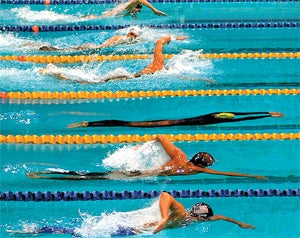
Your support helps us to tell the story
From reproductive rights to climate change to Big Tech, The Independent is on the ground when the story is developing. Whether it's investigating the financials of Elon Musk's pro-Trump PAC or producing our latest documentary, 'The A Word', which shines a light on the American women fighting for reproductive rights, we know how important it is to parse out the facts from the messaging.
At such a critical moment in US history, we need reporters on the ground. Your donation allows us to keep sending journalists to speak to both sides of the story.
The Independent is trusted by Americans across the entire political spectrum. And unlike many other quality news outlets, we choose not to lock Americans out of our reporting and analysis with paywalls. We believe quality journalism should be available to everyone, paid for by those who can afford it.
Your support makes all the difference.
What courses? Sport science; physical education and sport; sports coaching; sport development; coach education and sports development; sport and exercise science; sport & exercise; sport & exercise nutrition; sports coaching and physical education; sport, health and exercise sciences; sports therapy; sport management; sports science and personal training; sport and exercise psychology; sports biomedicine; sports rehabilitation; sports technology; equine sports science.
What do you come out with? BSc or occasionally BA with some programmes like coach education and sports development.
Why do it? "If you’re hoping to pursue a career in the sport and health industries, are interested in the study of management applied to sport, or just how the body works, then sports science and its related disciplines could prove the perfect degree programme for you. Sports science encompasses a wide range of subjects from biology and physiology to psychology, sociology and sports management. Most degree programmes will allow you to gain a varied grounding before specialising in your preferred areas. Not only will a degree enable you to fine tune your interests, but it can lead to opportunities for further study and specialisation as well as practical work experience if taken as a sandwich course." - Dr Matthew Pain, programme director, sport and exercise science, Loughborough University
What's it about? How the brain functions during precision sports like archery; how muscle develops and degenerates; the psychology of elite performance; how to motivate people to exercise and stick at it; biological rhythms, body clocks and jetlag; immunology in relation to elite athletes and how to combat their susceptibility to viral infection. You learn what makes athletes run faster, throw further, or jump higher, and how best to prepare beforehand and recover afterwards. You study the effect of exercise on health among the general public and how to motivate people to get out there and do it. Anatomy and physiology, psychology, nutrition and bio-mechanics are core modules on all courses, making the degree largely science-based. At some places you can specialise in an area like coaching. Manchester Metropolitan runs a course in Coaching and Sport Development which focuses less on the science and more on sport in the context of business and coaching. Loughborough has a variety of joint honours programmes that allow students to combine sport science with subjects such as maths and English. Sport science with management is particularly popular and Birmingham even offers a course in applied golf management studies.
Study options: Three years, or four years if studied with a language, as part of a sandwich degree or at a Scottish university. At some institutions students have the opportunity to work in GP referral and exercise or physiotherapy, sports science athlete support, local primary and secondary teaching and in local or national sports development organisations. Assessment is based on a combination of coursework and exams, using a variety of assessment modes. Students usually do a research project in their third year.
What will I need to do it? Usually anything will do, although some universities specify one science and joint honours courses will often require the accompanying subject at A-level. A typical offer at Loughborough will be AAA for its flagship sport and exercise science degree. Liverpool John Moores asks for 260 UCAS points/BCC, while Manchester Met asks for a minimum of 240 points.
What are my job prospects? Good. Students go into sports and leisure industry, teaching, or fire and police services. Some become coaches or nutritionists, while others go on to do further research. According to The Times’ Good University Guide 2012, 33 per cent of graduates go straight into graduate-level jobs, earning an average salary of just over £18,000. 17 per cent continue with further study.
Where’s best to do it? Loughborough came top of the Complete University Guide 2012, followed by Durham, Edinburgh and Exeter. Students were most satisfied at Glyndwr however, closely followed by Aberystwyth and Southampton Solent.
Related courses: Physiotherapy, medicine, radiography, physiology; health and social care; podiatry; biomedical science.
Join our commenting forum
Join thought-provoking conversations, follow other Independent readers and see their replies
Comments